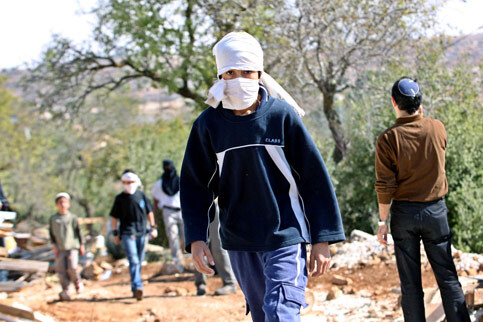
Masked Jewish settlers gather near an illegal settlement outpost near the West Bank city of Hebron, 31 October. (Mamoun Wazwaz/MaanImages)
I was part of a group of journalists and peace activists recently attacked by stone-throwing Israeli youths in an olive grove near the West Bank city of Hebron. Fortunately, I was not hit. Hazem Bader, a Palestinian photographer working for Agence France-Presse, was not so lucky and ended up needing eight stitches on his scalp and a night in hospital.
The immediate trigger for the incident was the Israeli army’s demolition of an unlicensed structure in the settlement of Khirsina last Thursday evening. The residents of Khirsina, a satellite of the notorious Kiryat Arba settlement in the centre of Hebron, responded by launching a night-time attack on nearby Palestinian houses, throwing hundreds of rocks, smashing windows and damaging water pipes.
Recently, I visited the Dana family with members of the Hebron team of the Ecumenical Accompaniment Programme in Palestine and Israel (EAPPI), an organization that provides a protective international presence to vulnerable Palestinian communities in the West Bank. The Danas live directly next to the “security barrier,” a fence/wall being built by the Israeli government supposedly to protect its citizens from attacks by Palestinian militants. Ironically, during the night’s disturbances, the settlers had broken down several sections of the fence so that they could better attack the Dana house.
As we inspected the damage to the water pipes, a group of masked youths began to gather near the demolished building, on the Israeli side of the now-broken fence. Photographers from various news agencies were on hand to record the incident. I was hidden in a small olive grove, noting that while there were Israeli police officers in the area, they did not approach and seemed to have no intention of trying to stop the attack that was about to happen.
As the photographers approached the settlers, the latter suddenly began to throw stones at them. My vantage point was close by. Rocks started crashing around me, breaking branches and slamming into the earth. I quickly returned to the Dana house, where I again narrowly avoided being hit by rocks thrown by the youths. A little while later, the Palestinian photographer was taken to hospital and the settlers went away.
Fortunately, that particular incident lasted only a few minutes and only one person was injured. However, there is a growing trend of violence amongst Israeli settlers in the West Bank, directed against both Palestinians and members of the Israeli military forces. Israeli caretaker Prime Minister Ehud Olmert stated on Sunday that “there is a not insignificant group of outlaws that are behaving in a manner that is threatening the rule of law. This is an intolerable situation that we refuse to accept.”
The Israeli government, which has encouraged the building of settlements in the West Bank in violation of international law since it occupied the territory in 1967, stated on Monday that it will act to remove settlement outposts. These are structures built in violation of international agreements, without official permission and against Israeli law but with tacit support from the Israeli authorities. In 2005, an Israeli government investigation found that state authorities had colluded with the settlement movement to establish over 100 outposts in the West Bank, donating US$17 million to such projects between 2000 and 2004.
However, now Olmert’s government has announced that it will cut off all public funding and support for illegal Jewish settlement development in the West Bank, in response to an “intolerable” rise in violence directed towards the Israeli security forces. For its part, the settlement movement says it has adopted a “price tag” policy whereby the removal of outposts will result in retribution. While several members of the Israeli police and army have been injured in such attacks, local Palestinians are apparently considered a far easier target, being unarmed and unprotected by the Israeli authorities.
The coming months are therefore likely to be a period of tension between the government and the settlers, who have in the past resorted to political assassinations to achieve their goals. For the Dana family and other Palestinians living near Israeli settlements, it seems that no reprieve is in sight as they struggle to lead normal lives.
Paul Adrian Raymond is working in Yanoun, near Nablus, for the World Council of Churches’ EAPPI programme (www.eappi.org), which provides protective international presence to Palestinians and campaigns for a just resolution to the Israeli-Palestinian conflict through the application of international law. He recently graduated in Arabic and Middle Eastern Studies from Leeds University in the UK.



